Related Research Articles

Gojong,personal name Yi Myeongbok,later Yi Hui,also known as the Gwangmu Emperor,was the penultimate Korean monarch. He ruled Korea for 43 years,from 1864 to 1907,first as the last king of Joseon,and then as the first emperor of the Korean Empire from 1897 until his forced abdication in 1907. His wife,Queen Min,played an active role in politics until her assassination.

Sunjong,personal name Yi Cheok,also known as the Yunghui Emperor,was the last Korean monarch. He ruled from 1907 to 1910 as the second and last emperor of the Korean Empire. Sunjong was elevated to the throne after his predecessor and father,Gojong,was forced to abdicate by the Empire of Japan. Hence,Sunjong has been characterized by historians as being a powerless puppet ruler of the Japanese,reigning for just three years before Korea was officially annexed in 1910.
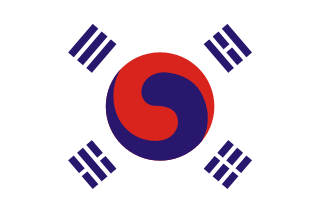
The Korean Empire,officially the Empire of Korea or Imperial Korea,was a Korean monarchical state proclaimed in October 1897 by King Gojong of the Joseon dynasty. The empire stood until Japan's annexation of Korea in August 1910.

Yi Kang,Prince Imperial Ui,also known as Prince Uihwa, was the second son of Emperor Gojong of Korea and his concubine,Lady Jang,who was a court lady-in-waiting.

Empress Sunjeonghyo,was the second wife of Sunjong of Korea,and was also the first Empress consort of Korea.

Empress Myeongseong is a 2001 and 2002 South Korean television series that aired on KBS2.

Min Yeong-hwan was a politician,diplomat,and general of the Korean Empire and known as a conservative proponent for reform. He was born in Seoul into the powerful Yeoheung Min clan which Heungseon Daewongun hated,and committed suicide as an act of resistance against the Eulsa Treaty imposed by Japan on Korea. He is remembered today for his efforts on behalf of Korean independence in the waning days of the Joseon period and a statue to his memory now stands on a traffic island near Chungjeongno Intersection,his namesake,after having previously been located at Anguk Intersection in 1957,before being moved due to road widening to near Donhwa Gate of Changdeok Palace in 1970 where it was criticized for not matching the surroundings,and then near the General Post Office next to Jogye Temple in 2003,where it was reportedly neglected until 2022.
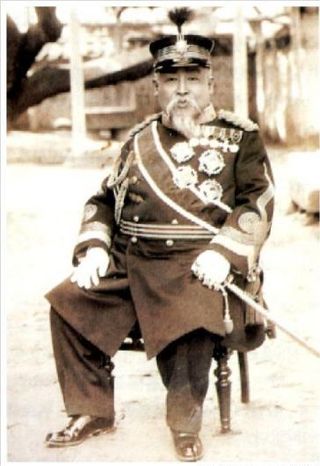
Prince Imperial Heung was a prince of the Joseon dynasty and of the Korean Empire. He was the son of Heungseon Daewongun and the elder brother of Emperor Gojong of Korea. By birth,his original name was Yi Jae-myon and the art name was U-seok;after he acquired the "Prince Imperial" title,his name was changed to Yi Hui on 25 August 1910. Five days later,the Japan–Korea Treaty of 1910 became effective,Yi Hui lost the imperial title and received a title "Duke Yi Hui" instead.
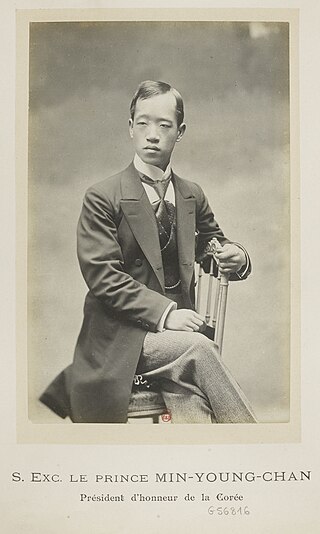
Min Yeong-chan,was scion of the powerful Min clan of the late Joseon period in Korea. Along with his elder brother Min Yeong-hwan,Yeong-chan served in a number of official positions towards the end of the Joseon dynasty. In 1900,he served as a Korean commissioner to the Paris Universal Exposition.

Yun Yeong-ryeol was a Korean Joseon Dynasty politician and soldier. nickname was Gyungjae,Yeongu. uncle of Yun Chi-ho and grandfather of Yun Bo-seon,father of Yun Chi-young.
Kim Mun-geun,posthumously called Duke Chungsung,was a Korean nobleman and politician during the late Joseon Period. He served in various high-ranking positions at the court of his son-in-law,King Cheoljong. He was also the father of Queen Cheorin,primary wife of King Cheoljong.

The Order of the Plum Blossom was the Order of chivalry of the Korean Empire. It was the third highest order of Korean Empire.

Yi Jong-geon was a lieutenant-general of the Imperial Korean Army. He was ennobled as Baron of Japan during the Korea under Japanese rule. After March 1st Movement,Yi tried to return his title but he failed.
Yi Hak-gyun was a general and an official of Korean Empire. He was one of the Pro-Russian and American politicians of the Korean Empire like Yi Yong-ik.

Order of the Taegeuk was an order of chivalry of the Korean Empire that was given to military or civil officials. It was divided into eight classes. It was part of the establishments of orders on 17 April 1897. From 22 April 1897,order of the taegeuk started to be awarded.
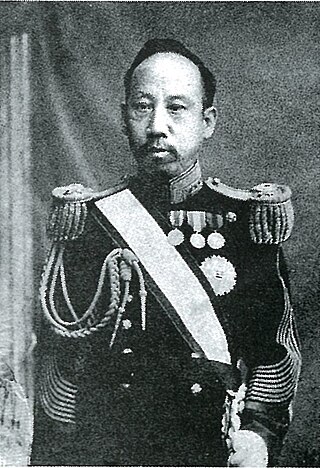
Han Kyu-seol was a prime minister of Korean Empire when the Japan–Korea Treaty of 1905 was signed. Han opposed the treaty,but failed to prevent it from being signed.

Yi Geun-taek was an official of Korean Empire who signed the Japan-Korea Treaty of 1905 as Minister of Military and became one of the Five Eulsa Traitors. He later became viscount after annexation of Korea.

Min Sang-ho was Korean official and soldier of Korean Empire. He was part of the Chinilpa because he was ennobled as baron after annexation.

Yi Jae-gak was a member of the Imperial house of the Korean Empire and an official of Korean Empire. After the annexation of Korea,he was ennobled as Marquess.
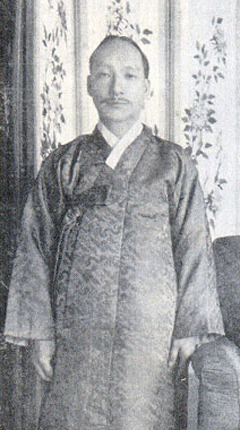
Yoon Taek-young was an official of Joseon and Korean Empire. He was father of Empress Sunjeonghyo and father in law of Sunjong of Korea.
References
- ↑ "History". Kyujanggak.
- ↑ "궁내부(宮內府), Gungnaebu" (in Korean and English). The Academy of Korean Studies. Archived from the original on 2011-07-16. Retrieved 2009-01-01.
- 1 2 궁내부 (宮內府) (in Korean). Empas / Encyclopedia of Korean Culture . Retrieved 2009-01-01.
- ↑ 일반현황 (in Korean). Cultural Heritage Administration . Retrieved 2021-03-28.
- ↑ 조선·대한제국 관보. "宮內府官制改正案" . Retrieved 2022-08-09.
- ↑ "궁내부(宮內府) - 한국민족문화대백과사전". Encyclopedia of Korean Culture . Retrieved 2022-08-08.
- ↑ "한국고전종합DB". db.itkc.or.kr. Retrieved 2022-05-12.
- ↑ "한국고전종합DB". db.itkc.or.kr. Retrieved 2022-05-12.
- ↑ "한국고전종합DB". db.itkc.or.kr. Retrieved 2022-05-12.
- ↑ "한국고전종합DB". db.itkc.or.kr. Retrieved 2022-05-12.
- ↑ "한국고전종합DB". db.itkc.or.kr. Retrieved 2022-05-12.
- ↑ "한국고전종합DB". db.itkc.or.kr. Retrieved 2022-05-12.
- ↑ "한국고전종합DB". db.itkc.or.kr. Retrieved 2022-05-12.
- ↑ "한국고전종합DB". db.itkc.or.kr. Retrieved 2022-05-12.
- ↑ "한국고전종합DB". db.itkc.or.kr. Retrieved 2022-05-12.
- ↑ "한국고전종합DB". db.itkc.or.kr. Retrieved 2022-05-12.
- ↑ "한국고전종합DB". db.itkc.or.kr. Retrieved 2022-05-12.
- ↑ "한국고전종합DB". db.itkc.or.kr. Retrieved 2022-05-12.
- 1 2 "한국고전종합DB". db.itkc.or.kr. Retrieved 2022-05-12.
- ↑ "한국고전종합DB". db.itkc.or.kr. Retrieved 2022-05-12.
- ↑ "한국고전종합DB". db.itkc.or.kr. Retrieved 2022-05-12.
- ↑ "한국고전종합DB". db.itkc.or.kr. Retrieved 2022-05-12.
- Kun-Woo Kim (김건우). "A Study of Public Document Management Regulations of Gungnaebu" (in Korean). Records Management & Archives Society of Korea (한국기록관리학회지): 111~128.
{{cite journal}}: Cite journal requires|journal=(help)
